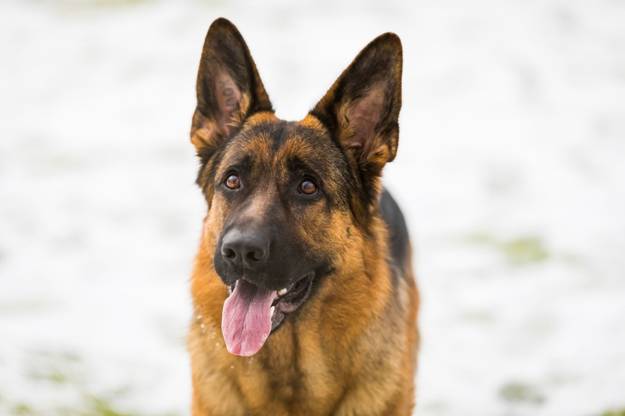Hi human! My name is Max, and I’m a German Shepherd. I know that we have a pretty mean reputation, but I promise that I am the friendliest German Shepherd that you will ever meet. Although I won’t bite, a German Shepherd’s teeth can be quite prominent.
German Shepherd teeth can be intimidating, but they play a very important role in our mouths. As German Shepherds, we rely on our teeth just as much as any other dog breed. That’s why I really appreciate it when you make sure that our dental health is a priority and help us take care of them. Proper care will help us prevent possible dental problems, from the teething stage as a German Shepherd puppy, to a full adult set of canine teeth when we’re older.
I’m going to tell you everything you need to know about German Shepherd teeth, including how to take care of them and what health issues to look out for.
Importance of German Shepherds Teeth
As German Shepherds, we rely on our teeth just like any other dog. Unlike you humans, we don’t have hands or opposable thumbs, so the only option we have for picking things up is our mouth! We need to make sure that we have clean teeth to eat, groom, and stay healthy.
Here is what you will find in any German Shepherd’s mouth:
Gums
Bluish or black tongue along with grey or black-pigmented gums. Don’t be alarmed by the black spot – it’s what you humans call melanin, a natural pigment.
Teeth
As adults, we usually end up having 42 teeth. I know that’s a lot more than you humans have! But like humans, each set of teeth in a dog’s mouth has a function.
- Incisors: We have 12 of these. They are for scraping meat off the bone when we’re finishing up our meals and removing pesky fleas from our coats.
- Canines: These are used for grasping bone.
- Premolars: We use these to chew our dog food.
- Pointed Molars: We use these for biting and crushing bone.
It’s important that you take care of each one of our teeth to make sure that each one continues to play their part in our mouth!
Common German Shepherd Tooth Issues

German Shepherd teeth need the same amount of care that the adult teeth of other types of dogs need, or else other issues may arise.
Here are some common issues that may occur if our tooth health is neglected. You humans will probably recognize these issues, as you might also get them!
Plaque and Tar Build Up
Plaque is common in both dogs and humans. Plaque is a film that can build up on a dog’s teeth if they are not regularly brushed. If plaque is not removed through brushing, it hardens and becomes tartar buildup. This usually starts to show on the molars and premolars then works its way to the canines. Plaque can creep up and take over before you notice it, causing other problems, so watch out for this one!
Gingivitis
Yes, dogs get gingivitis just like you humans do, and us German Shepherds are not immune.
Gingivitis is the inflammation of the gums and develops when plaque is not removed from the teeth. This causes the gums to be inflamed, then bleed quickly and easily. If you don’t treat gingivitis in us right away, it can become a more serious infection known as periodontitis.
Periodontitis
Periodontitis is a gum infection that affects not only the gums but also other tissues around the teeth. It can lead to permanent teeth loss, bone loss, and other serious health infections. Please do not let our lack of tooth care get to this point, as periodontitis can be very painful for a German Shepherd!
Bad Breath
Bad breath is not only a sign of bad brushing, but it is also a sign of periodontitis. If left unchecked, periodontitis will cause us to not only lose our teeth, but we might also develop ulcers in our mouths, and even develop infections in the rest of our body.
In extreme cases, it can also be a sign of more severe health issues, such as organ damage. So if you notice that your German Shepherd suddenly has bad breath, take them to the vet as soon as possible!
Pain and Discomfort
Even if we luckily don’t develop periodontitis, improper brushing can still lead to a lot of discomfort and pain in our mouths. While German Shepherds don’t usually whine when we are in pain, I know that some of my friends might become aggressive or angry, especially if you try to touch their teeth.
We might also lose our appetite, and avoid drinking water because the temperature of the water hurts our teeth.
German Shepherd Gum Issues

It’s not only German Shepherd teeth that need special attention. You will want to monitor our gums as well to ensure the overall health of our mouth.
Although bleeding from gingivitis is a big indication that something is wrong, the color of our gums can tell you a lot about the overall health of our mouth and body.
- Slightly red: As with humans, red or bleeding gums in German Shepherds are usually a sign of gingivitis or inflammation.
- Very red: If our gums are bright red, it could be because we are suffering from heat stroke, or we have been exposed to toxins.
- Pale: If our gums are more pale than usually, it is likely that we may be suffering from anemia. This is usually caused by a more serious problem, such as bleeding or infection.
- Yellow: Yellow gums in German Shepherds may be a sign of leptospirosis, which is a bacterial infection that can be passed to humans, so you will want to be extra careful with this one! Yellow gums can also be caused by jaundice and be a sign of liver disease.
If your German Shepherd’s gums are ever this color or they exhibit any of these signs, please take them to the vet right away.
How to Take Care of German Shepherd Teeth
Did you know that dental disease is one of the most common problems that we face as dogs? Special attention needs to be paid to dog teeth, and German Shepherd teeth are no different.
Here are some ways that you can help us take better care of our teeth.
Brushing
Dogs need their teeth brushed just like humans do. If you just adopted one of us (yay!) and we’re not used to brushing, slowly begin to introduce the habit until it becomes natural.
You should start cleaning our teeth 2 to 3 times a week once we turn 6 weeks old. Use a special dog toothbrush and toothpaste (yes, they make those!). Better yet, you can let us brush our own teeth!
It’s best to brush our teeth when we’re relaxed — I like it when my owner speaks to me while brushing my teeth.
You should focus on the outer surfaces of our teeth because our tongue naturally cleans the inside surfaces. If you notice a tartar buildup, it’s a good idea to use a dental scaler to scrape it away.
Diet
I like a little crunch in my food! Wet food can stick to my mouth which can cause tooth decay. Ouch! This is why I prefer to eat good quality dry food without too much added sugar. Plus, dry food also helps me exercise my chewing muscles. A great choice all around!
Chew Toys
I will be honest, this is probably my favorite form of German Shepherd tooth care. Can you believe that there are dog treats and dog chew toys that can help control tartar and help improve the health of my teeth? I didn’t believe it until I saw it!
These can include actual chew toys, or some tasty bones. However, when choosing bones for a German Shepherd, it is crucial to make sure that the toy is safe.
Please don’t give me crooked bones as a chew toy, they are too brittle and if a piece of bone gets stuck in my stomach, it can cause internal bleeding. Choose a sturdy bone based on the size and chewing ability of your dog. Raw bones are acceptable only if you supervise it.
A rope toy is also a great idea. From my experience, the texture of the rope helps clean away anything sticking in between or to my teeth. Plus, I have great fun chewing away, although I usually just end up ripping it apart.
This chew toy is actually my favorite because it also has a built-in brush. I can take care of my teeth and have fun doing it!
Visit to the Vet
If you think that a German Shepherd may already be suffering from a dental disease, such as gingivitis, please take them to the vet right away for treatment. This applies to any breed of dog.
Signs that we may be suffering from a dental disease include:
- Bad breath (worse than usual, of course!)
- Loss of interest in chew toys
- Increased salivation
- Being fussy with food
Bring us to the vet as soon as possible to see what treatment is available. Hopefully the issue can be fixed with antibiotics, but in severe cases, tooth extraction might be necessary. Ow! That’s why you need to monitor the health of our mouth to catch any potential problems early on.
Older German Shepherd Teeth
Just like in humans, the tooth health of older German Shepherds often tends to decline. Older German Shepherds often suffer from bad teeth and related health issues, even with proper brushing.
As all dogs age, our teeth start to become more brittle and less functional. You may even start to notice that we begin to lose some teeth or that they become chipped, broken, or decayed. As
As I’ve already mentioned, German Shepherd teeth are imperative not just for eating and grooming, but for a range of everyday activities. You can’t really fight old age, but you can help us slow this process by taking good care of our teeth throughout our lives.
Taking Care of German Shepherd Teeth
Well human, I hope I taught you a lot about German Shepherd teeth. You now know that when it comes to our teeth, German Shepherds are not too much unlike humans. We can develop many of the diseases you can develop, and suffer a lot of the same consequences as well.
However, if you take care of our teeth, you help prevent us from suffering those consequences. With proper brushing, daily monitoring, and regular check-ups, your German Shepherd’s teeth can stay strong, healthy, and pristine — as they should be!